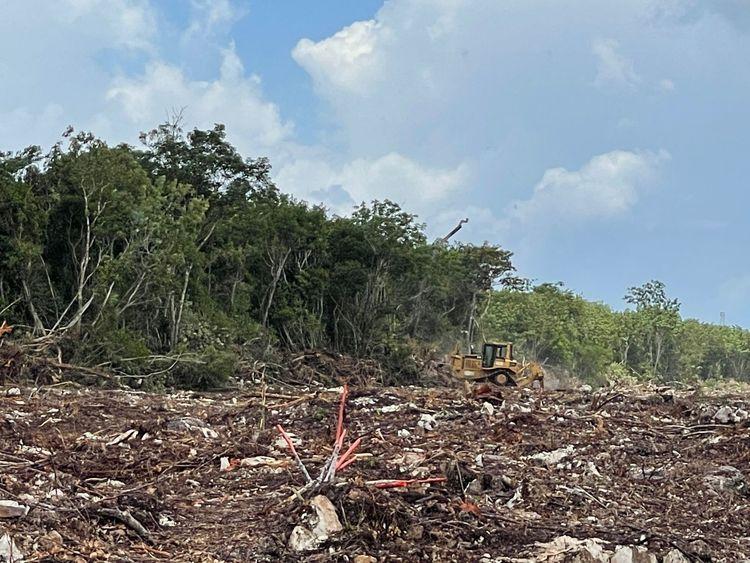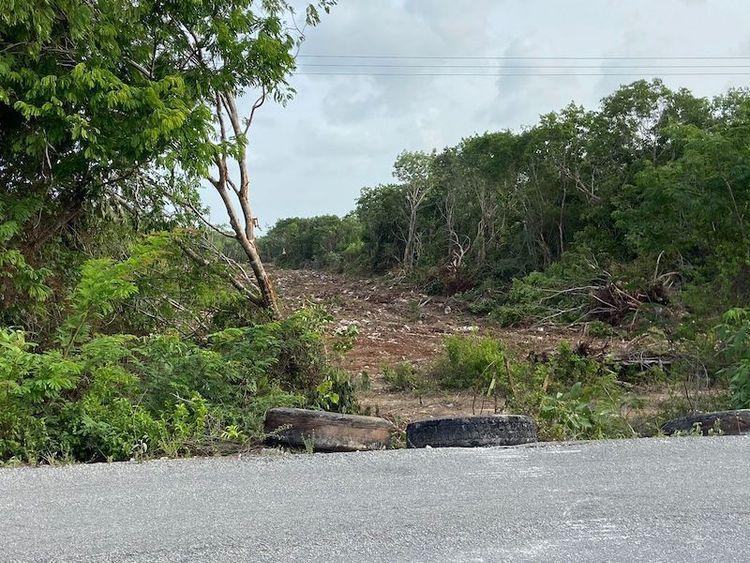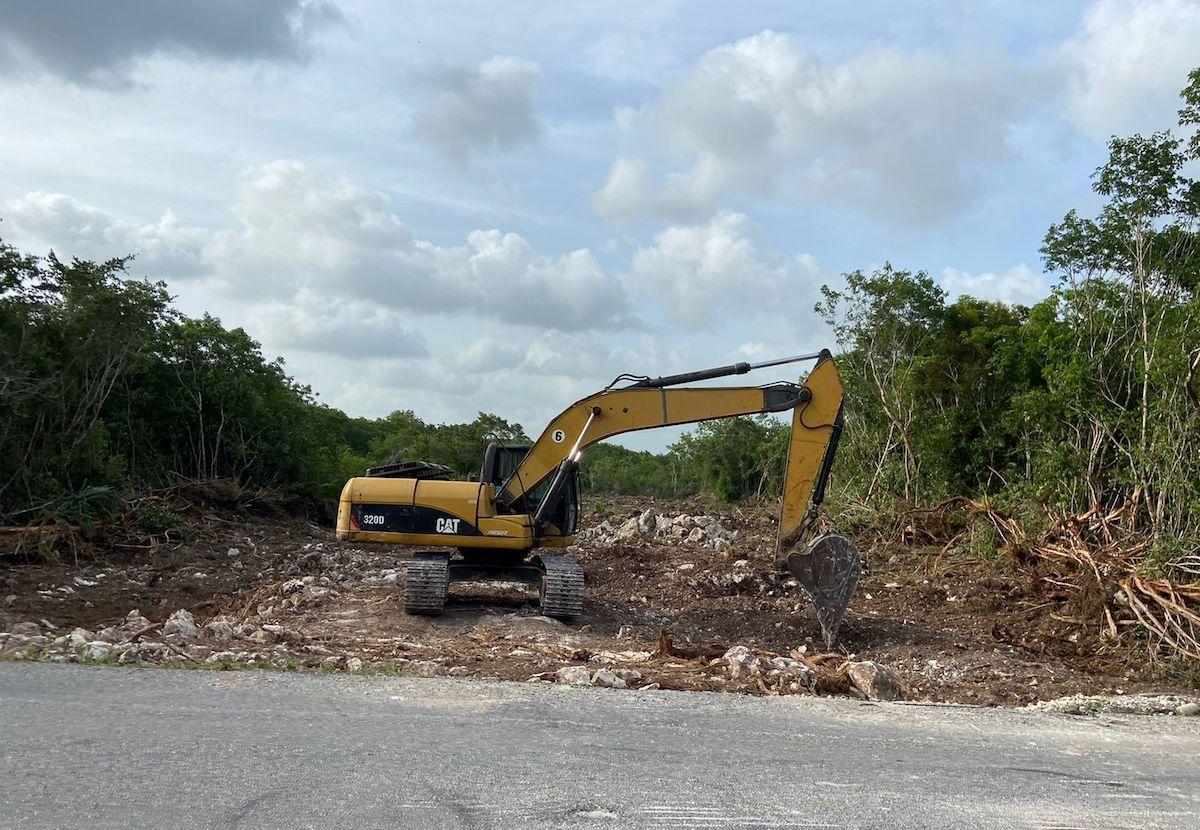Last Monday, July 14, the federal government resumed work on the Maya Train in Southern Section 5, which was paused due to a judicial suspension, and work also began on Section 5 North, near Puerto Morelos.
In an informal interview given to the media at the National Palace on July 18, the head of the National Fund for Tourism Promotion (Fonatur), Javier May, reported that after a session of the National Security Council, the railway project was considered essential for “national security” and the powers of its execution were transferred to the Ministry of the Interior and the Secretariat of Security and Public Protection. This was confirmed by President Andrés Manuel López Obrador during his morning conference on July 19.
With this maneuver, the federal government evaded the judicial suspension of the works that resulted from an application for amparo filed by environmentalists from the Right to a Healthy Environment (DMAS) organization.
Miguel Anguas, lawyer for the collective Indignación AC, explained to Journalism CN that the government's action is not illegal, but he considered it arbitrary.

Photo: Paola Chiomante
When classifying the Mayan Train project as a national security project, he pointed out that many of the things pre-established in the laws are automatically overlooked, such as administrative procedures, environmental impact assessment, licenses, permits, and others.
With this, the government has the door open to continue with the work, even if it has not complied with the requirements set out in the General Law on Ecological Balance and Environmental Protection and even if a federal judge has issued a suspension, in the protection of those who disagree.
The lawyer points out that, based on Mexican regulations, declaring it 'national security' also allows for budgetary reallocations not included in the Federation's Expenditure Budget.
“With this concept, they can limit the participation of native peoples, both in the approval of the project and in the execution. At the same time, it allows him to include the Army, the Government and the Secretariat of Security in a civil project,” he said.
The legal strategy of the Presidency of the Republic, he explained, is the application of the Amparo Law under the precept of “separate rope”, that is, that the incident and the suspension are being processed separately.
Under the Amparo Act, when a trial is initiated in this way, a measure of protection may be issued within the trial. In the case of the Maya Train, the precautionary measure was to temporarily suspend work.
The Act provides for how and in what cases the measures are applicable. However, article 129 of that regulation states that the incident and the suspension must be handled separately when national security is jeopardized.
In this way, although amparo lawsuits are still open, the works of the Mayan Train can continue while cases are resolved in court.
With the Government's decision, Miguel Anguas asserted, indigenous communities dissatisfied with the project are left in a state of defenselessness.
“What's going to happen is that by the time those cases are resolved, for or against, the Maya Train will be built and operating,” he added.
The works: more jungle felling
The resumption of work took environmental groups in the Riviera Maya by surprise, who since January 2022 have spoken out against the project.
“They reported the machines sneaking in during the night, so stealthily that they know how badly they are doing,” said José Urbina, an activist and promoter of the amparos.
In Puerto Morelos, the entry of the machinery also caused astonishment among the inhabitants, since Section 5 South does not have authorization in terms of Environmental Impact. In fact, the evaluation process before the Secretariat of Environment and Natural Resources (Semarnat) has not yet begun, as it has not been published in the Official Gazette.
In both sections of the project, work began removing trees from what was virgin jungle.
“It is a disposition of our knowledge against a political calendar that seeks to have the train on a date, but now, by breaking the law in this blatant way, it becomes an affront to all Mexicans,” said Urbina.

Photo: Iván Cadena
The Selvame del Tren collective, which brings together more than a dozen environmental organizations and activists, does not rule out demonstrations.
Pedro Uc, representative of the Assembly of Defenders of the Mayan Territory Muuch Xiinbal, said that it is already “a custom” of the head of the federal Executive, Andrés Manuel López Obrador, to ignore the Law and the communities.
“It is a project that is being done against Mayan communities, which will have a significant impact on the environment, the life and security of the peoples,” he said.
Uc argued that it is strange that a means of tourist transport, such as the Mayan Train, is considered national security.
The Muuch Xiinbal Assembly filed amparos for sections 2, 3 and 4 of the Train. However, the work there was never paused because they did not obtain suspensions from a judge.
“They have never respected the amparos, they passed them through the Arc de Triomphe. There is a false discourse that we are from the extreme right, that we want to harm them, that the projects belong to the people. It's a cynical lie and a way to manipulate a lot of people,” the indigenous activist attacked.



Comentarios (0)